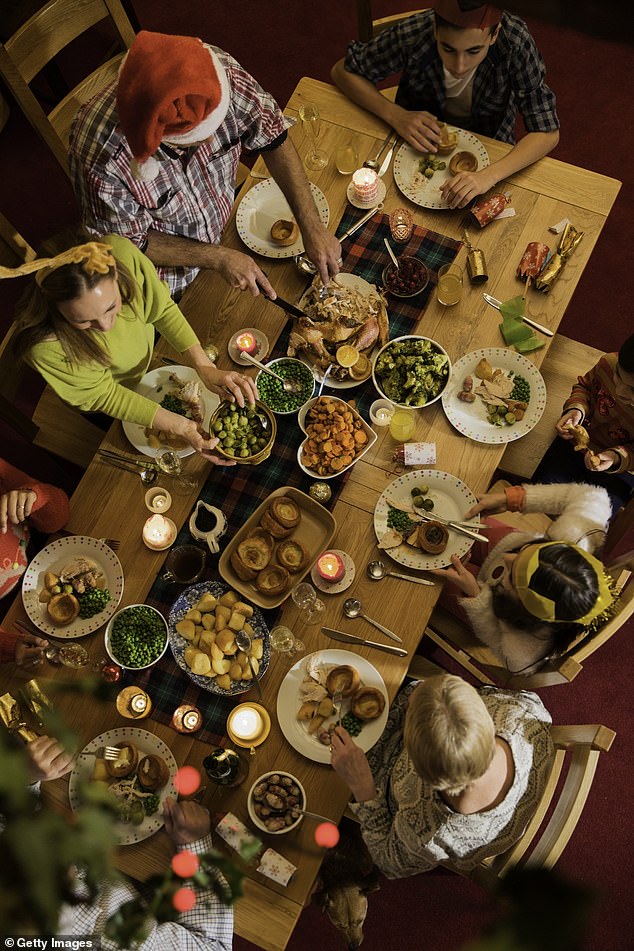Feeling as full as turkey on Christmas Day has become an accidental holiday tradition for many.
But for some, stomach problems may not just be caused by overeating.
The cause, experts have warned, could actually be a cancer that kills almost 17,000 Britons each year and is increasing among those under 50.
According to the latest international data, this rise in bowel cancer is affecting Britain more dramatically than most other Western countries, including the United States.
Now a health expert has warned of five warning signs that could emerge over Christmas dinner, indicating Brits may be suffering from more sinister gut health problems.
And perhaps most surprising is feeling overfull faster than usual.
Kiran Jones, clinical pharmacist at Oxford Online Pharmacy, warned of a painful feeling of fullness that “does not go away after digestion.” or it wakes you up at night.’
This could be a sign of an obstruction or tumor in the intestine, he added.
Feeling as full as turkey on Christmas Day has become an accidental holiday tradition for many. But for some, stomach problems may not just be due to overeating

Bowel cancer can cause you to have blood in your stool, a change in bowel habit, or a lump inside the intestine that can cause blockages. Some people also experience weight loss as a result of these symptoms.
‘A constant feeling of fullness may occur if there is an obstruction or tumor in the intestine.
“If it lasts more than a few days, it may indicate intestinal health problems or, worse, bowel cancer,” he said.
“While it’s tempting to write this off as a big Christmas meal, monitor the symptom closely, especially if it persists or worsens.”
However, other symptoms are more commonly associated with the disease.
Jones added: “Christmas is a busy time of year and you can expect to feel tired after preparing the turkey or serving a house full of guests.”
“But if you find it harder than usual to stay awake or struggle with constant fatigue that isn’t relieved by rest, this could be a sign that your body is trying to tell you something more serious.
“Bowel cancer can cause anemia, as blood loss in the intestine reduces the number of red blood cells in the body, causing exhaustion.”
Spotting blood in your stool, whether bright red or dark, is another well-recognized sign of the condition.
He added: “Although hemorrhoids or minor tears from exertion can cause this, persistent bleeding is a key warning sign of bowel cancer.”
“Over Christmas, don’t dismiss this symptom as a one-time thing caused by eating rich foods or alcohol – make an appointment with your GP.”
Eating too much at Christmas can also lead to more frequent visits to the bathroom, especially after a rich meal packed with foods high in fat and sugar.
However, if you need to go to the bathroom more often than usual and it’s not just a result of overeating, this could be a red flag.
“Pay attention to any changes in your bowel habits, such as persistent diarrhea or constipation, or an urgent need to go,” Mr. Jones said.
“If these symptoms continue long after the festive feast, it might be time to seek medical attention, as they may be early indicators of bowel cancer.”
According to the NHS, anyone who experiences these symptoms for three weeks or longer should speak to their GP.
Bowel cancer symptoms can also be caused by other conditions, such as irritable bowel syndrome, but it is important to get checked so the disease can be detected as early as possible.

Dame Deborah James, nicknamed the ‘gut babe’, raised more than £11.3 million for cancer research and is credited with raising awareness of the disease, which killed her in 2022, aged 40.
comes as experts continue to warn of a worrying rise in bowel cancers in under-50s, which has baffled doctors around the world.
The disease, the third most common cancer in the UK, is the same type that killed Dame Deborah James. at 40 years old in 2022.
Each year there are more than 44,000 new diagnoses of bowel cancer in the UK and almost 142,000 in the United States.
While the cause of the rise in bowel cancer among young people remains under investigation, experts estimate that more than half of the cases diagnosed in Britain each year are preventable due to known cancer risk factors.
A shocking one in four preventable cases is because Britons consume too little fiber (found in fruit, vegetables and whole grains), which is known to be a key factor in good digestive health.
About one in 10 cases is triggered by eating processed meat, and a similar number are due to people who are overweight or obese.
Studies have suggested that the risk of developing bowel cancer increases by 18 per cent when people consume more than 50 grams of processed meat (one sausage) per day.
One in 20 cases is due to alcohol consumption, smoking and lack of exercise.
Research suggests that drinking just half a liter of low-strength beer a day, about two units, could increase the risk of bowel cancer by 4 percent, and the risk increases with higher alcohol consumption.
About one in 50 cases of bowel cancer are thought to be caused by exposure to radiation, for example treatment with radiotherapy.
A fifth of bowel cancer cases are thought to have their origins in a genetic risk.
Symptoms of bowel cancer include changes in bowel movements, such as new diarrhea or constipation, needing or feeling like having a bowel movement more or less frequently, and blood in the stool.
Stomach pain, a lump in the stomach, bloating, unexpected weight loss and fatigue are other key signs.
According to the NHS, anyone who experiences these symptoms for three weeks or longer should speak to their GP.


